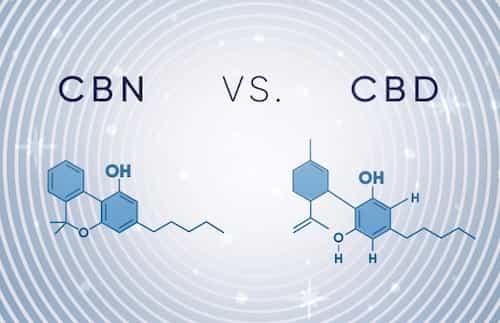Our comprehensive guide is aimed at informing you about the differences between CBN and CBD, two of the most prevalent cannabinoids in the hemp plant, and how they interact with your body.
CBD, or cannabidiol, is by far the most common and a prominent cannabinoid, abundant in the hemp plant, with potential therapeutic benefits such as pain relief, reducing anxiety and depression, and improving sleep. However, unlike THC, it does not cause any psychoactive effects. In contrast, CBN, or cannabinol, is formed through oxidation or exposure to light and air when THC breaks down. CBN is also non-psychoactive, although its therapeutic benefits are not as well-known as those of CBD.
CBD and CBN: What Sets Them Apart?
Both CBD and CBN are non-psychoactive, but they offer different potential therapeutic benefits. CBD is well-known for its anti-inflammatory and pain-relieving properties, as well as its anxiolytic effects, while CBN is believed to have a sedative effect and may aid in sleep. CBN may also be effective in treating certain skin conditions due to its antibacterial properties. CBD, on the other hand, has antipsychotic properties and may be effective in treating neurological disorders like epilepsy.
CBD and CBN: How Do They Interact with Your Body?
Both CBD and CBN interact with the endocannabinoid system in your body. This system is responsible for regulating various bodily functions such as pain, mood, and appetite through receptors and neurotransmitters. CBD primarily interacts with the CB1 and CB2 receptors, while CBN interacts with the CB2 receptor. The different receptor binding of CBD and CBN may explain why they have different effects on the body.
CBD and CBN: Are There Any Side Effects?
Although CBD and CBN are generally safe, they can cause side effects in some people. Dry mouth, fatigue, and changes in appetite are some of the common side effects of CBD, while CBN may cause drowsiness or sedation. It's also essential to note that these compounds can interact with certain medications, so it's crucial to consult with a healthcare provider before using them.
Conclusion
CBD and CBN are two of the most popular cannabinoids found in the hemp plant, with different potential therapeutic benefits. CBD is known for its anti-inflammatory, pain-relieving, and anxiolytic effects, while CBN is believed to have a sedative effect and may aid in sleep. Both compounds interact with the endocannabinoid system in the body, and they can cause side effects in some people. It's important to consult with a healthcare provider before using CBD or CBN, especially if you're taking other medications.







